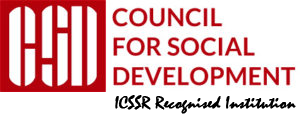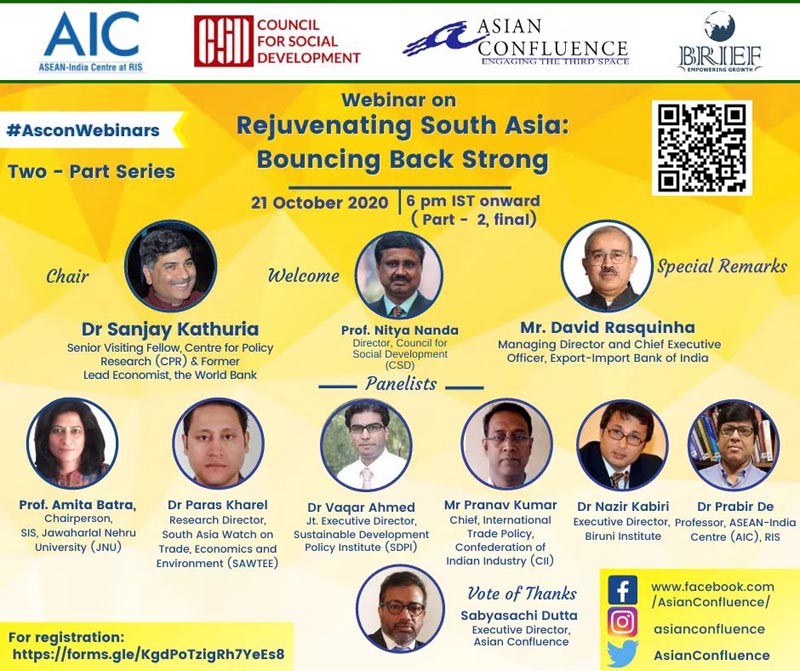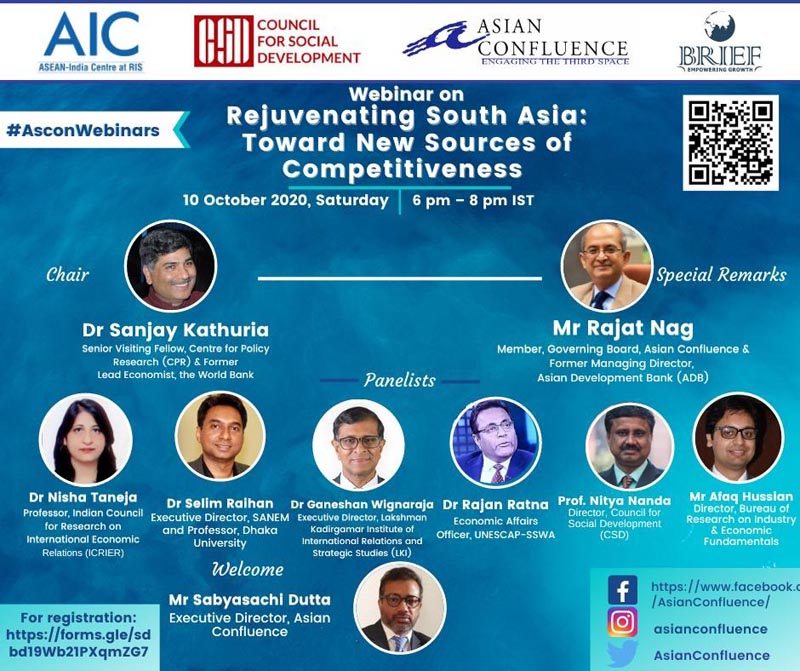Webinar on Rejuvenating South Asia Toward New Source of Competitiveness
View event session @ https://www.facebook.com/watch/live/?v=907443243115575
AsConWebseries || Rejuvenating South Asia: Toward New Sources of Competitiveness
Date : 7th October 2020
Please visit https://www.facebook.com/watch/live/?v=907443243115575
Durgabai Deshmukh Memorial Lecture 2020
Durgabai Deshmukh Memorial Lecture 2020
DDML Webinar on
Are Today’s Crises Catastrophic Enough for Neoclassical Economists and Neoliberal Politicians to Change Their Minesets?
by Ashok Khosla
Wednesday, July 15, 2020 at 4.00 p.m.
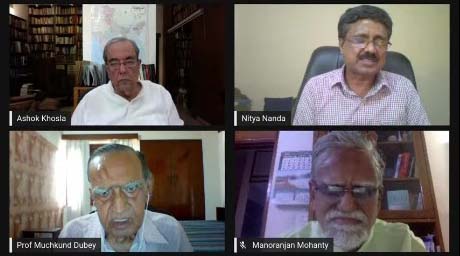
Abstract:
Historically, deep structural change in society has originated either from charisma or from crisis. Since charismatic leaders seem to arise only once in several hundred years, for most transformative change we have to depend on crises. Indeed, the economist Milton Friedman is reputed, to have said “A crisis is a terrible thing to waste”. Although the ends for which he sought transformations were the polar opposite of what I believe is needed for a healthy and truly prosperous society, he did get the means right in an age deprived of the true mahatmas who can bring about a new societal paradigm.
The crises of today are the life-threatening products of grossly flawed intellectual and ethical choices that we have made in our search for “development” over the past few centuries — particularly during recent decades. Paradoxically though admittedly most tragically, they are also the life-saving rafts that could in principle bring us in to the safe harbour of a green, equitable and universally prosperous economy. Despite the mindsets of those who make decisions at the highest levels, with their interests so deeply vested in the status quo, it is now a matter of civilizational, human and planetary survival that we urgently and fundamentally change, and in many cases turn upside down, the assumptions and practices of both the “science” and praxis of economics.
About the Speaker
Since 1982, Chairman of the Development Alternatives Group, the world’s first social enterprise dedicated to sustainable development. Innovation by the nonprofit DA, and incubation and market delivery by the commercial affiliate, TARA create sustainable, scalable consumption and production solutions in rural India. Earlier, after faculty positions at Harvard, Ashok Khosla became Director of the Indian Government’s first Environment Office and then Director of Infoterra in UNEP. He has been Co-Chair of the UN’s International Resource Panel, President of the International Union for Conservation of Nature (IUCN) and President of the Club of Rome. He was a member of the Government of India’s National Security Advisory Board and Scientific Advisory Council to the Cabinet and was awarded the OBE by the UK Government, the UN’s Sasakawa Environment Prize, UAE’s Zayed International Environment Prize, WWF’s Duke of Edinburgh Medal and the Award for Outstanding Social Entrepreneur by the Schwab Foundation. He has an MA from Cambridge University and a PhD in Experimental Physics from Harvard University.
Land Right Movement of Dalit Women in Marathwada: Combating Poverty, Hunger and Gender Inequality
Schedule of the Programme
Speaker: Abhishek Bhosle, Assistant Professor, Vishwakarma University, Pune
Chair: Professor Manoranjan Mohanty, Distinguished Professor and Vice-President, CSD New Delhi and Editor, Social Change
Date: March 19, 2020 (Thursday)
Time: 3.00-4.30 PM
Venue: Durgabai Deshmukh Memorial Lecture Hall, CSD, Sangha Rachna, 53 Lodi Estate, New Delhi 110003
About the Presentation:
Dr B R Ambedkar on 23 February 1941 in a meeting in Solapur district gave a call to Dalits to fight for seeking government-owned wasteland for cultivation. By 1958-59 the movement spread in other parts of Maharashtra and Dalit women led the movement along with their male counterparts. Many were jailed with their kids. In 1964-65, Ambedkar’s close confidant Bhaurao alias Dadasaheb Gaikwad took the reins of the movement and launched a massive agitation of landless labourers across India to claim government land for cultivation. Over 3.4 lakh landless people were jailed across India. This was the biggest movement by Dalits in India after Dr. Ambedkar’s death in 1956. The movement came alive again in 1990 under the leadership of Eknath Awhad under the banner of Jameen Adhikar Andolan (Land Rights Movement).
As landless Dalits turned cultivators, villagers and local leaders turned furious. The struggle to get control of these wastelands and to retain cultivation rights on these lands has not been an easy one for Dalit women. They had to confront opposition not only from their families and caste mates, but also from upper castes landowners in the villages who, on experiencing labour shortage because of landless labourers turning cultivators’ often orchestrated attacks on Dalit bastis and burning standing crops on the lands cultivated by Dalits. Dalit women farmers remained undaunted by such attacks and continued cultivation as it helped them to escape severe poverty, send their children to school and gradually earn a higher say in decision making at the family and the societal level. The Maharashtra government passed orders in 1978 and then in 1991 to extend legal rights to Dalits and other backward castes who have encroached the government owned lands for cultivation. However, a majority of cultivators were left out of the legalization process because they had no proof of cultivating these lands.
This paper, based on available literature as well as personal interviews of Dalit women cultivators, traces the trajectory of Jameen Adhikar Andolan over the decades, role of women in sustaining this movement, and the mechanism through which the movement made them feel more empowered in socio-economic realm.
About the Speaker: Abhishek Bhosale, a Development Communication researcher works on the ideas of Development from the perspectives of caste and gender. His current research projects revolve around the struggle of tribals, the peasant class and landless labourers in the Shramik Movement in Shahada and Nandurbar in Maharashtra, and Dalit struggle for land rights in Marathwada. He is also actively engaged with a people’s movement at the grass root level to promote media literacy and the democratization of Media.
Abhishek is currently teaching Journalism and Mass Communication at Vishwakarma University, Pune where he is also a part of the core team for developing a research centre on Development Communication and Rural Journalism.
Abhishek has written articles and reportages on water crisis in Maharashtra and its impact on gender and caste relations, atrocities against minorities in Maharashtra, the film society movement in Kerala, and Journalism in times of conflict in Kashmir. He is a regular contributor to various media platforms like Daily Divya Marathi, Media Watch, Muktshabd, Aksharnama, Aksharlipi,etc. He also writes critical commentaries on contemporary media in the Sunday column called ‘Media Mania’ for Dainik Divya Marathi. He is on the review committee of a bilingual communication journal called ‘Media Messenger’.
International Women’s Day 2020 – Ways Women Lead in the Domestic, Social & Political Space
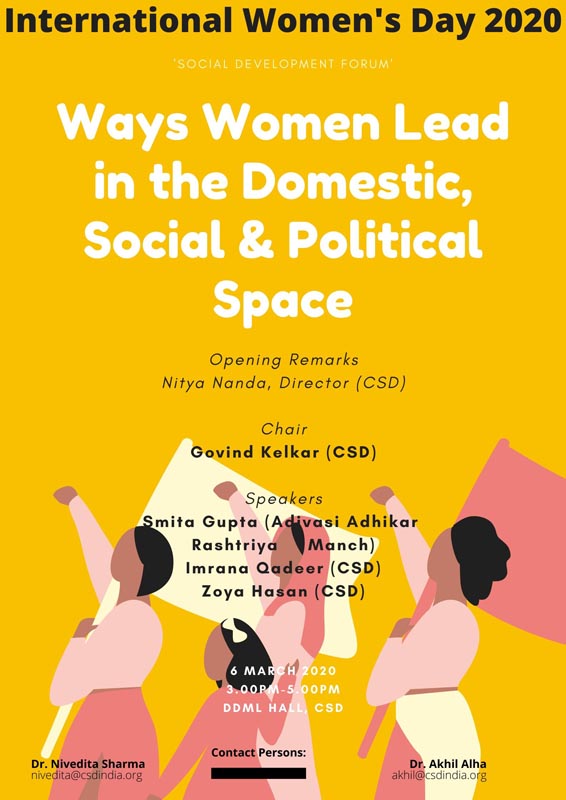
Schedule of the Programme
Welcome and Opening Remarks
Dr. Nitya Nanda
Director, CSD New Delhi
Speakers
- Ms. Smita Gupta
Adivasi Adhikar Rashtriya Manch - Prof. Imrana Qadeer
Council for Social Development, New Delhi - Prof. Zoya Hasan
Council for Social Development, New Delhi
Chair
Prof Govind Kelkar
Council for Social Development, New Delhi
Date: March 6, 2020 (Friday)
Time: 3:00-5:00 PM
Venue: Durgabai Deshmukh Memorial Lecture Hall, CSD, Sangha Rachna, 53 Lodi Estate, New Delhi 110003
We sincerely hope that you will join and enrich the panel discussion.
Dr Nivedita Sharma Dr Akhil Alha
(nivedita@csdindia.org) (akhil@csdindia.org)
“I measure the progress of a community by the degree of progress women have achieved”
-Dr. B. R. Ambedkar
Gender-based issues have had a long standing history in the academic, social and policy circles world-wide. The issues are multiple, highly varied, complex and multi-layered. Inquiries into these issues reveal deep-rooted inequalities, explicit as well as implicit, that have fostered discrimination across space and time with negative consequences on the overall development and well-being of women.
In the domestic sphere, women of the household not only have fewer resources but also face disproportionate burden of unpaid house-work. All these inequalities are both a cause and effect of low status of women in the house and their minimal participation in the decision-making process. Further, patterns of social hierarchies, dominance of patriarchal systems and cultural and religious norms have fostered a society where women have been denied the right to make strategic choices/decisions about their lives; to go out and work, to access education & skill-development, to access productive resources, to access healthcare etc. Also, class and caste based discrimination further add to the vulnerabilities of the women.
Another important aspect of overall well-being is availability of adequate exposure to political life. Even in the era of highly-representative governments, the role of women in public life is substantially limited, in most developed nations as well. Lack of political participation by women exists both in terms of active involvement as representatives and also as a group to be represented. Women’s ability to organize themselves in social groups, self-help groups or other groups for mutual benefits including religious and community- based organizations reflects the magnitude of liberality among citizens of the society in accepting women in public life. Access to political decision-making has long-term consequences for the equitable development of the society.
Earlier there was an overall lack of consciousness and understanding about the structures of patriarchy functioning within families, homes and society at large. Women were indeed ignored. But this very ignorance generated a counter-intuitive process of delving deep into individual experiences, and unpacking patriarchy through them. It gave birth to new perspectives, a feminist consciousness, reflections on the productive and reproductive roles of women, their practical and strategic needs, the impact of patriarchy on women’s individual and collective lives and their abilities to cope, counter, and resolve. There is thus increased awareness level of women in the domestic, social and political space and the participation of women is evolving in reclaiming their rights.
It is in this context that Social Development Forum of Council for Social Development, New Delhi would like to observe International Women’s Day with a panel discussion on
Training Workshop on Social Impact Assessment and Resettlement Planning
Date : 25th – 27th February, 2020
Venue: India International Centre, New Delhi
The programme this year was focused on ‘Social Impact Assessment and Resettlement Planning’. The objective of this workshop is to familiarize participants with newer, more effective ways of managing the emerging resettlement challenges. The workshop will be suitable for senior/middle level government officials, public sector personnel, industry managers, NGOs, academics, trainers and also those working in international development agencies as well as personnel working on projects financed by them.
Council for Social Development, New Delhi invites you to a panel discussion on Union Budget 2020-21
Date: 18 February 2020
Venue: DDM Hall, Council for Social Development, 53, Sangha Rachna, Lodhi Estate, New Delhi-110003
Programme Details
Session I: Macroeconomic Aspects of Union Budget 2020-21 (10.00-11.30 AM)
Chair: Professor Muchkund Dubey
Panelists:
- Prof Biswajit Dhar, JNU
- Prof Abhijit Das, Head, Centre for WTO studies, IIFT
- Prof Atul Sarma, CSD
- Prof Nitya Nanda, CSD
Tea: 11.30-11.45 AM
Session II: Social Sector Schemes and Marginalised Sections in Union Budget (11.45 AM-1.15 PM)
Chair: Prof K B Saxena, CSD
Panelists:
- Prof Muchkund Dubey, CSD
- Prof Ritupriya Mehrotra, CSMCH, JNU
- Prof R Govinda, CSD
Lunch: 1.15-2.00 PM
Session III: Agricultural and Rural Development in Union Budget (2:00-3.30 PM)
Chair: Prof Praveen Jha, JNU
Panelists:
- Prof T Haque, CSD
- Dr Ashwini Majahan, Swadeshi Jagaran Manch and PGDAV College, DU
- Prof Ashok Pankaj, CSD
Ambedkar’s Theory of the Social: The Universal Condition of Recognition
Speaker: Prof Martin Fuchs, University of Erfurt, Germany and German Co-Director, ICAS: MP
Chair: Professor K B Saxena, Distinguished Professor, CSD New Delhi
Date: February 13, 2020 (Thursday)
Time: 3.00-4.30 PM
Venue: Durgabai Deshmukh Memorial Lecture Hall, CSD, Sangha Rachna, 53 Lodi Estate, New Delhi 110003
About the Talk: Social Justice as understood by Babasaheb Dr. Bhimrao Ambedkar can be taken as a shorthand for a whole bundle of values and norms which a decent society is meant to provide and which is required for each of its members to be able to lead a dignified life. While Ambedkar put strong emphasis on the chance for each individual to develop his or her capabilities, equality and justice for him had to be grounded on mutual respect, social recognition and compassion, or what he, with others, called fellow-feeling.
Ambedkar’s attempt to achieve this in the case of his own society through political struggle and by legal means – culminating in his work on the Indian Constitution – was accompanied by his endeavour to gain a deeper understanding of the mechanisms of society and explore the
role of social values therein. He both explored the place and possibilities of social ethics and thought of ways of establishing such ethics that would generate a just society. It was in this context that the question of religion achieved special prominence for Ambedkar.
The presentation reconstructs Ambedkar’s sociological and socio-philosophical explorations of the conditions for a just society. The focus is on what one could call Ambedkar’s theory of the social, which underlies his conceptualization of religion and of social and religious change. The talk starts by looking at Ambedkar’s emphasis on social values and on the dispositional and attitudinal dimensions of social behaviour that affect the ways people relate to each other. This is followed by a discussion of his views of the social significance of religion and his attempts to distinguish between religion that realizes the human core values, and religion that fails on the criterion of justice. The overall argument refers to the ontological assumptions regarding human nature and the nature of human sociality underlying Ambedkar’s views.
About the Author: Martin Fuchs studied Anthropology, Sociology und Modern South Asian Languages and Literatures at the Universities Marburg, Heidelberg and Frankfurt/Main, and received his PhD from the University Frankfurt/Main. This was followed by teaching appointments at the Universities of Zürich, Heidelberg and the Free University in Berlin. At the Free University he also did his Habilitation (postdoctoral qualification).
In the following years Martin Fuchs held teaching and research positions at the Universities of Paderborn; Heidelberg (South Asia Institute); Free University Berlin; Central European University, Budapest; and the University of Canterbury, Christchurch (New Zealand). Martin Fuchs was Founding Director of the New Zealand South Asia Centre (2008-2009). Since 2009 Martin Fuchs holds the Professorship of Indian Religious History at the Max Weber Centre for Advanced Cultural and Social Studies (Max-Weber-Kolleg) of the University of Erfurt.
The research interests of Martin Fuchs lie in Cultural and Social Theory; the Anthropology, Sociology and Religious Studies of South Asia; Social and religious movements; Dalit studies; Urban Anthropology and Human Rights issues.
Social Change Golden Jubilee Lecture 2020
Social Change Golden Jubilee Lecture 2020
From Home to the Borders; Violence Against Women, Impunity and Resistance
By
Uma Chakravarti
Chair Prof. Muchkund Dubey, President, Council for Social Development
Uma Chakravarti, feminist scholar and noted historian, delivered the Social Change Golden Jubilee lecture, 2020 entitled, From Home to the Borders; Violence Against Women, Impunity and Resistance. The lecture examined the violence and suppression from sexual assault to domestic abuse that affected millions of women in the country. Contextualising the content with specific examples, Prof. Chakravarti said that this expression of violence can be found particularly in four arenas: in the homes; in the streets and fields; in villages and regions, and borderlands. All these arenas have exhibited features linked to the manner where impunity exists. Women, in both rural and urban India, have been victims of a continuum of violence and have suffered an ongoing application of male power, including by the police and armed forces. The impunity enjoyed by the perpetrators of these assaults has been responsible for their brazenness and their frequency and it is therefore important to point to the slow pace shown by the State to address this issue.
As Chair, Prof Muchkund Dubey commented on the prevalence of violence against women and girls all over the world, and stressed the importance of engaging in debates about the intersection between gender and violence, women’s rights and human development.
The lecture marked the 50th year of publication of Social Change. The quarterly is brought out by the Council for Social Development and is published by SAGE. The annual lecture, part of the journal’s Golden Jubilee series, is supported by the Anthropological Survey of India, SAGE Publications and India International Centre.
About the Speaker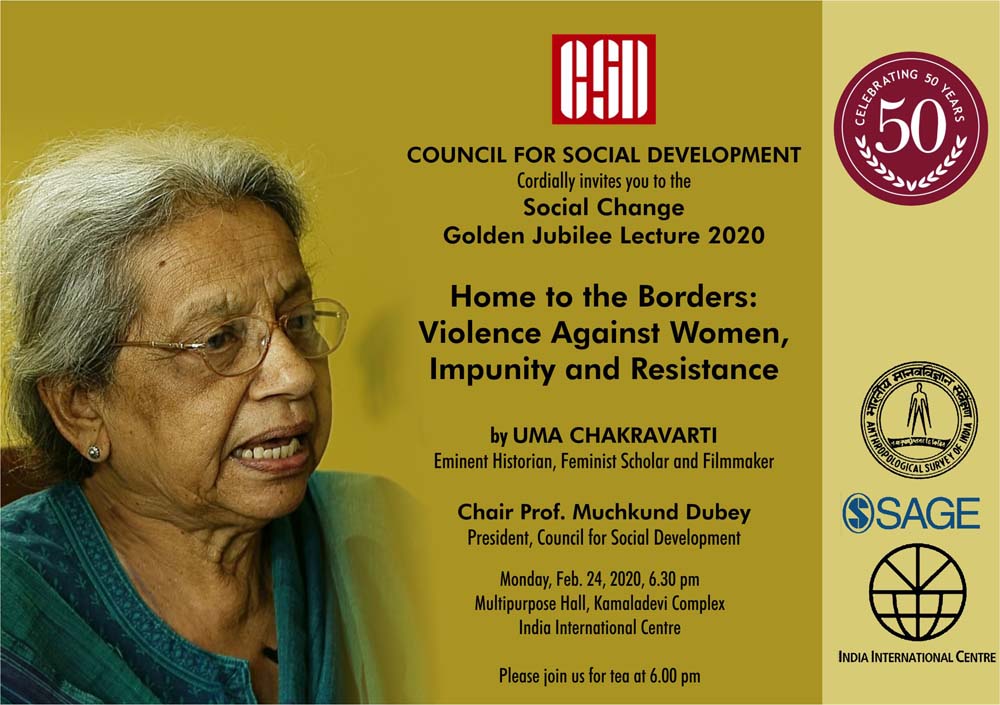
Uma Chakravarti is a historian who has worked and written on issues of caste, labour and gender and is active in the democratic rights and women’s movements. Among her early published works are, Social Dimensions of Early Buddhism. Her subsequent writings include, Rewriting History: The Life and Times of Pandita Ramabai and Gendering Caste through a Feminist Lens. A leading scholar of women’s and feminist history writing in the subcontinent, she has been described as one of the pioneers of the women’s movement in India.
Apart from engaging with feminist issues, she has also worked as a democratic rights activist, participating in several fact-finding committees including the International Tribunal on Justice for Gujarat. The feminist scholar has also directed two documentary films – A Quiet Little Entry and Fragments of a Past, both of which focus on women’s history in India.
